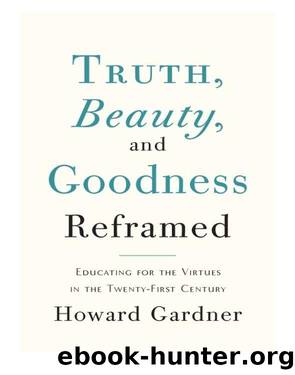Truth, Beauty, and Goodness Reframed by Howard Gardner

Author:Howard Gardner
Language: eng
Format: epub
Publisher: Basic Books
Published: 2011-02-10T16:00:00+00:00
Educators pursue four principal pedagogical goals. First, produce a population that is literate and numerate. (This goal is universal, uncontroversial, and will not concern us further.) Second, provide the tools whereby future citizens can learn the truths of the society. (This goal is achieved through the transmission of key disciplinary lenses and practical procedures of work.) Third, ensure that the important moral laws (typically drawn from the ambient religious and legal codes) are known and enforced. Finally, transmit those human creations—narratives, crafted objects, decorations, dances, songs—whose forms and messages are most valued by the culture.
Let’s now consider the ways in which educators in our time can achieve these ambitious goals. Within the school context, truths exist in three major disciplinary families. The first is mathematics—certain statements or laws are true by virtue of definition (5 = 1 + 3 + 1) or proof (the angles of a triangle sum to 180º). The second is history—the recording and transmission of names, dates, and events, with as much accuracy as possible. Literary and other records are essential for history, even if they are not necessarily sufficient. The third is science—the effort, through observation and experimentation, to describe, model, and explain the physical, natural, and human worlds.
Note that disciplinary understanding is not the same as the mere accrual of facts (sometimes termed subject-matter knowledge). Facts are fine but they do not in themselves involve any disciplinary understanding. Moreover, in this day of handheld devices, there is little point in memorizing facts that are instantly available at one’s fingertips. Rather, educators should help students to understand the ways in which disciplinary specialists establish and confirm knowledge. This acquisition necessarily involves immersion in the kinds of activities in which specialists are regularly engaged—carrying out proofs in mathematics, making systematic observations and conducting experiments in science, or poring over documents and graphic materials in history.
Establishing these various truths is hardly an easy or straightforward matter. Even mathematical truths can be contested, especially when new branches of mathematics are established. History is a matter of construction and reconstruction, crafting accounts that are revised both in terms of discoveries of new documents and by virtue of the fresh vantage point provided by the present era. As philosopher Karl Popper insisted, science is a matter of subjecting existing claims to the most rigorous tests. The possibility of falsification is the earmark of scientific work—and, not incidentally, the reason why creationism (or its successor stealth position “intelligent design”) is not science. New paradigms cause old ones to be rejected as limited, misleading, or even false. And new paradigms are not necessarily true for all time but are themselves subject to partial or complete replacement. Still, the succession of paradigms is by no means arbitrary: By and large, newly accepted paradigms are steps on the road to better established and more broadly based truths.
So far, I’ve been reviewing the “truths of school” without particular attention to age. When working with young people, there is an additional challenge to the establishment and transmission of truth—particularly the truths of science.
Download
This site does not store any files on its server. We only index and link to content provided by other sites. Please contact the content providers to delete copyright contents if any and email us, we'll remove relevant links or contents immediately.
Professional Troublemaker by Luvvie Ajayi Jones(29644)
Whiskey Words & a Shovel I by r.h. Sin(19387)
Rewire Your Anxious Brain by Catherine M. Pittman(18632)
Healthy Aging For Dummies by Brent Agin & Sharon Perkins RN(17033)
Cat's cradle by Kurt Vonnegut(15322)
Talking to Strangers by Malcolm Gladwell(13339)
The Art of Thinking Clearly by Rolf Dobelli(10407)
They Both Die at the End by Adam Silvera(9798)
The 5 Love Languages: The Secret to Love That Lasts by Gary Chapman(9772)
Doing It: Let's Talk About Sex... by Hannah Witton(9273)
The Compound Effect by Darren Hardy(8918)
Thirteen Reasons Why by Jay Asher(8881)
Goodbye, Things by Fumio Sasaki(8571)
Wonder by R.J. Palacio(8564)
Tools of Titans by Timothy Ferriss(8359)
Atomic Habits: Tiny Changes, Remarkable Results by James Clear(8315)
Becoming Supernatural by Dr. Joe Dispenza(8194)
Wonder by R. J. Palacio(8095)
Change Your Questions, Change Your Life by Marilee Adams(7732)
